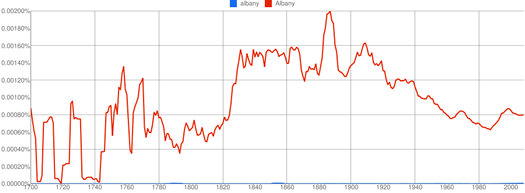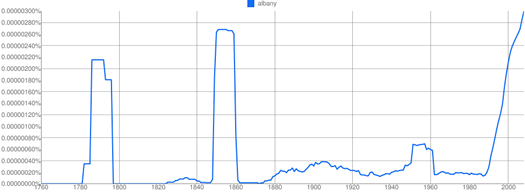When Albany was in print

Thoughtful chin scratch...
Update: Alex set us straight -- see his comment about searching for "Albany" vs. "albany." The new graph is above (the old graph is after the jump).
The capital-A Albany graph makes more sense. It was a little weird that there was little or no mention of Albany prior to 1780 -- the city had already been been incorporated for almost 100 years by that point.
_____
Google recently opened up access to a massive dataset collected from digitized books -- some 500 billion words from 5.2 million books. The hope is this dataset will enable interesting sorts of quantitative research for the humanities.
The simplest of this sort of research involves word counts. The Google dataset includes counts for how often a word was used in the texts over time. Go ahead -- you can try it for yourself.
Roland emailed us today after doing search for "Albany." The results are in the graph above.
You have to figure there was spike toward the end of the 1700s because of New York becoming a state. Any thoughts on the reasons for the spike around 1850 (Civil War lead up?) -- or 1950, or since 1988?
(Thanks, Roland!)
graph: Google
Previously posted graph:

Hi there. Comments have been closed for this item. Still have something to say? Contact us.
Comments
You should note that this search is case sensitive and the results for albany and Albany are very different. If you search them both simultaneously
(http://ngrams.googlelabs.com/graph?content=albany,Albany&year_start=1700&year_end=2000&corpus=0&smoothing=3)
you will see that people very rarely use albany as opposed to the usually correct Albany.
Its still interesting to see the peaks stark peaks in the lowercase version of the graph. The post 1988 increase seems to be universal across lowercase versions of proper nouns, which might lead you to believe the quality of editing has decreased over the last quarter century or so. Thats just one possible explanation.
... said Alex on Dec 20, 2010 at 7:05 PM | link
I wonder - have they taken into consideration the number of books representing a particular year or time period? You're bound to get more mentions if 1) more books were printed in those years or 2) the sample that populated the database overselected books from those years. Just saying.
... said Barold on Dec 20, 2010 at 7:12 PM | link
President Arthur
http://ngrams.googlelabs.com/graph?content=President+Arthur&year_start=1800&year_end=2000&corpus=0&smoothing=3
Garden Way
http://ngrams.googlelabs.com/graph?content=Garden+Way&year_start=1800&year_end=2010&corpus=0&smoothing=3
Cluette Peabody
http://ngrams.googlelabs.com/graph?content=Cluett+Peabody&year_start=1800&year_end=2008&corpus=0&smoothing=3
Watervliet Arsenal
http://ngrams.googlelabs.com/graph?content=Watervliet+Arsenal&year_start=1800&year_end=2008&corpus=0&smoothing=3
Cohoes
http://ngrams.googlelabs.com/graph?content=Cohoes&year_start=1800&year_end=2008&corpus=0&smoothing=3
... said Jeff S on Dec 20, 2010 at 8:44 PM | link
@Barold: Look here. Results are normalized for publication volume over time.
@Alex: Yes, the meaningful query is "Albany". Far as I know, the Ngram query syntax doesn't support conditional operators, so you can't do something like "Albany|albany" ... yet. OTOH, many of the datasets are available, and the graphical output is just Google Charts, so a motivated diver could mash something up for a special-interest query without too much trouble.
LQ
... said Lou Quillio on Dec 20, 2010 at 8:47 PM | link
WRT anomalies that don't have obvious maps to Albany, NY history, remember there's an Albany, Georgia that maybe generates 19th-century attention at various times.
Also, Albany, NY was a top-ten U.S. population metro from 1810 to 1860, so doings here would show spikes in published mention that we don't see in today's much larger nation and literary corpus.
LQ
... said Lou Quillio on Dec 20, 2010 at 9:06 PM | link
I've been trying to figure out whether this is anything other than a stupid web trick since they came out with it. It's not random, because Google's books come from certain collections (though at this point a vast array of them). It's not comprehensive, either. And it's highly repetitive -- Google books often has several editions of the same book (scanned from different collections), and none of related books you would expect to find. In the end it seems pretty meaningless.
Not only was Albany a top 10 city, as Lou Quillio mentions, but it was a major industrial center. central to canal and rail, and much more tightly tied to New York City than it is today. No mystery that it would have rated mentions in the books of the day.
... said Carl on Dec 21, 2010 at 8:01 AM | link
Yes, but print now has taken on a cyber dimension in so many ways.
Print is the past! Internet is the future!
One small part of the new mosaic = http://www.nysm.nysed.gov/albany/gallery.html
Best holiday wishes,
Steve Bielinski
just fyi: there are at least a dozen Albanys in the US alone
... said Stefan Bielinski on Dec 21, 2010 at 8:26 AM | link
@Carl - I've been trying to figure out whether this is anything other than a stupid web trick since they came out with it.
You know, it is what it is, fully disclosed: a big sloppy pile of indexed written matter, tagged by publication date. The user decides for herself what her query results mean, whether she's a skilled humanities researcher (the target audience) or my mom.
The only way to mistake one's query results is to mistake what the data is: a judgment-free pile.
LQ
... said Lou Quillio on Dec 22, 2010 at 12:53 AM | link